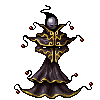Camera
Show how to work with the optional camera systems.
There’s a separate configuration for the main game camera and the UI camera.
The threeforms.png sprite image for this example is:

With the following threeforms.ron RON configuration file for positioning the center of the sprite:
(pivot_x: Center, pivot_y: Center)
The bunnymark.png sprite image for this example is:
With the following bunnymark.ron RON configuration file for positioning the center of the sprite:
(pivot_x: Center, pivot_y: Center)
Source
use chuot::{Config, Context, Game, KeyCode, MouseButton};
/// How fast the "player" moves.
const PLAYER_SPEED: f32 = 90.0;
/// Define a game state for our example.
#[derive(Default)]
struct GameState {
/// Simulate the horizontal player movement, the camera will follow this.
player_x: f32,
/// Simulate the vertical player movement, the camera will follow this.
player_y: f32,
/// Previous horizontal position, for smooth rendering.
previous_player_x: f32,
/// Previous vertical position, for smooth rendering.
previous_player_y: f32,
}
impl Game for GameState {
/// Move the "player" around with keyboard input.
fn update(&mut self, ctx: Context) {
// Set the previous position before updating the current one
self.previous_player_x = self.player_x;
self.previous_player_y = self.player_y;
// Move left on left arrow or 'a' key
if ctx.key_held(KeyCode::ArrowLeft) || ctx.key_held(KeyCode::KeyA) {
self.player_x -= PLAYER_SPEED * ctx.delta_time();
}
// Move right on right arrow or 'd' key
if ctx.key_held(KeyCode::ArrowRight) || ctx.key_held(KeyCode::KeyD) {
self.player_x += PLAYER_SPEED * ctx.delta_time();
}
// Move up on up arrow or 'w' key
if ctx.key_held(KeyCode::ArrowUp) || ctx.key_held(KeyCode::KeyW) {
self.player_y -= PLAYER_SPEED * ctx.delta_time();
}
// Move down on down arrow or 's' key
if ctx.key_held(KeyCode::ArrowDown) || ctx.key_held(KeyCode::KeyS) {
self.player_y += PLAYER_SPEED * ctx.delta_time();
}
// Follow the player with the main camera
ctx.main_camera().follow((self.player_x, self.player_y));
// Shake the camera when clicking, using the mouse position to determine the intensity and duration
if let Some((mouse_x, mouse_y)) = ctx.mouse() {
if ctx.mouse_pressed(MouseButton::Left) {
// Horizontal mouse is the duration, vertical mouse the force
ctx.main_camera().shake(1.0, mouse_x / 10.0, mouse_y / 4.0);
}
}
}
/// Render the game.
fn render(&mut self, ctx: Context) {
// Draw some bunnies to show the camera movement
for y in -10..10 {
for x in -10..10 {
// Load a sprite asset and draw it statically
ctx.sprite("bunnymark")
// Draw it at the same position every frame
.translate_x(x as f32 * 150.0)
.translate_y(y as f32 * 150.0)
// Draw the sprite on the screen
.draw();
// Draw the text on the same position as the sprite
ctx.text("Beachball", &format!("{x},{y}"))
// Draw it at the same position every frame
.translate_x(x as f32 * 150.0)
.translate_y(y as f32 * 150.0)
// Text uses the UI camera by default, so use the main camera
.use_main_camera()
.draw();
}
}
// Load a sprite asset and draw it
ctx.sprite("threeforms")
// Make the sprite move, the camera will follow it
.translate_x(self.player_x)
.translate_y(self.player_y)
// Make the sprite render smoothly by interpolating based on the render blending factor,
// this is applicable when there's multiple update tick calls in a single render tick,
// if we don't do this the player will move in a jittery motion
.translate_previous_x(self.previous_player_x)
.translate_previous_y(self.previous_player_y)
// Draw the sprite on the screen
.draw();
// Draw the instructions
let instructions = if let Some((mouse_x, mouse_y)) = ctx.mouse() {
format!(
"Arrow keys to move\n\nClick to shake camera:\n- Duration: 1.00 s\n- Amplitude: {:.2} px\n- Frequency: {:.2} hz",
mouse_x / 10.0,
mouse_y / 4.0,
)
} else {
"Arrow keys to move\n\nClick to shake camera".to_owned()
};
ctx.text("Beachball", &instructions).use_ui_camera().draw();
}
/// Setup the camera.
fn init(&mut self, ctx: Context) {
// Follow the camera slowly horizontally
ctx.main_camera().set_lerp_x(0.1);
// Follow the camera quickly vertically
ctx.main_camera().set_lerp_y(0.5);
}
}
/// Open an empty window.
fn main() {
// Game configuration
let config = Config {
buffer_width: 360.0,
buffer_height: 288.0,
// Apply a minimum of 2 times scaling for the buffer
// Will result in a minimum, and on web exact, window size of 720x576
scaling: 2.0,
..Default::default()
};
// Spawn the window and run the 'game'
GameState::default().run(chuot::load_assets!(), config);
}
Compatibility
| Chuột Version | Example Works |
|---|---|
| 0.3.0 | ✅ |
| 0.3.1 | ✅ |
| Unreleased | ✅ |